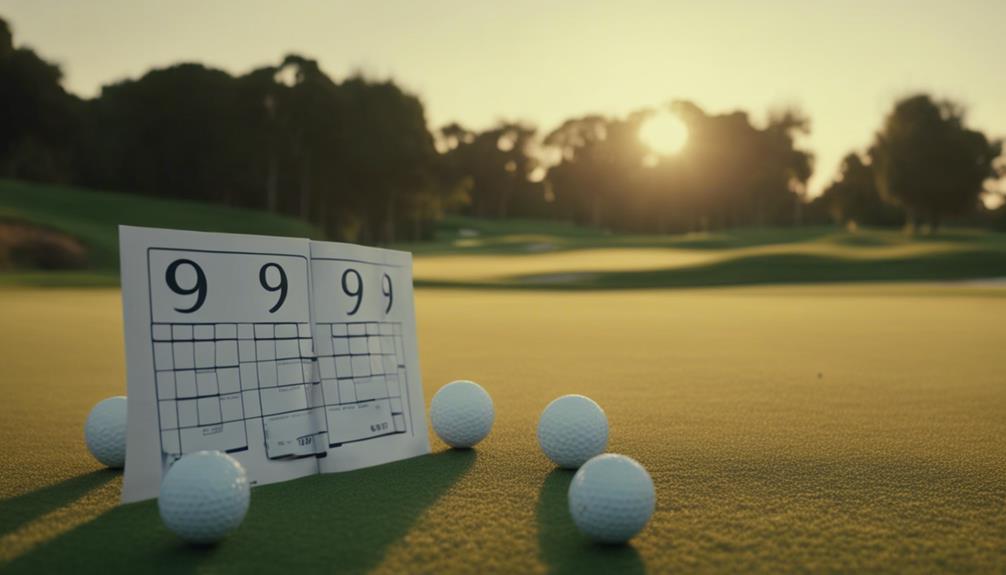- 7 Top Flite Golf Clubs XL for Improved Performance - September 28, 2024
- Top Flite Golf Clubs: Top 5 Reasons to Choose Them - September 28, 2024
- Top 3 Golf Club Fitters for a Perfect Swing - September 28, 2024
You're likely to view a score of 100 as a respectable milestone, especially if you're an amateur golfer playing on a par 72 course, where breaking 100 is a significant achievement that separates beginners from more experienced players. Scores around 100 are considered a good benchmark for amateurs, and understanding golf score benchmarks relative to course par and skill level is crucial. To refine your skills and consistently break 100, it's crucial to assess your performance, set realistic targets, and focus on improving your short game skills, course management strategies, and overall technique. By digging deeper, you'll uncover key insights to boost your game.
Key Takeaways
- Breaking 100 is a significant milestone in golf, indicating a respectable score for an amateur.
- A score of 100 or lower on a par 72 course is considered good, with scores around 100 being a benchmark for amateurs.
- Roughly half of golfers break 100, with an average score of around 91 for recreational golfers.
- Consistently breaking 100 requires dedication, practice, and improvement in short game skills, course management, and mental focus.
- Breaking 100 is an attainable goal, and with persistence and commitment, golfers can achieve it and continue to improve their scores.
Understanding Golf Score Benchmarks
When gauging your progress in golf, setting realistic score benchmarks is essential, and for many, breaking 100 is the first major milestone to target. As a golfer, you're likely wondering what constitutes a good score. On an average 18-hole par 72 course, a score of 100 or lower indicates you've reached a respectable skill level.
In fact, for most amateurs, scores around 100 are considered a good benchmark. Breaking 100 signifies steady improvement in your golf skills, demonstrating your dedication and practice.
As you aim for mastery, understanding golf score benchmarks is vital. A good golf score is relative to the course's par rating and your individual skill level. For instance, shooting 85 on a par 72 course is a solid score, but on a more challenging course, it might be average.
You'll need to assess your performance regularly, adjusting your goals and strategies accordingly. By setting realistic targets and tracking your progress, you'll stay motivated and focused on your journey to golf excellence.
Factors Influencing Your Score
As you work to break 100 and continue improving your golf game, you'll need to think about the various factors that can greatly impact your score. Your Handicap Index, for instance, plays an important role in determining your overall performance. Course difficulty is another vital factor, as it can either challenge or ease your game. Additionally, your mental focus is crucial in maintaining a consistent pace throughout the game.
To better understand the factors influencing your score, consider the following:
- Course conditions: Weather, terrain, and obstacles can all affect your game
- Physical fitness: Your overall health and fitness level can impact your endurance and accuracy
- Equipment quality: The right gear can enhance your performance, while subpar equipment can hinder it
- Experience level: The more you play, the more you'll develop your skills and instincts
- Skill development: Focusing on specific aspects of your game, such as your short game or driving, can lead to significant improvements
Improving Your Golf Technique

As you focus on improving your golf technique, you'll want to refine your swing by making adjustments to your grip, stance, and posture.
Developing consistent practice habits will also help you reinforce good habits and eliminate bad ones.
Swing Refining Tips
To refine your golf swing technique, start by seeking guidance from professional instructors who can identify and correct any flaws in your mechanics. They'll help you develop a consistent swing that'll improve your overall game. With their expert eyes, you'll be able to pinpoint areas for improvement and work on refining your technique.
Here are some additional tips to help you refine your swing:
- Use technology like Flightscope and V1 Swing Suite for advanced swing training
- Analyze your swing with tools like Blast Motion and BodiTrak pressure mapping to identify areas for improvement
- Focus on consistent practice to refine your swing and lower your golf scores
- Set specific goals for your swing technique and track your progress for measurable improvement
- Work with your instructor to develop a customized practice plan tailored to your needs and goals
Consistent Practice Habits
By committing to regular practice sessions, you'll develop muscle memory and refine your swing mechanics, ultimately leading to improved shot accuracy and overall golf technique.
Consistent practice habits are essential for mastering the game, as they allow you to build upon previous sessions and make incremental improvements.
Focus on structured practice routines that target specific areas, such as short game skills like putting and chipping, to enhance your performance.
Set specific goals for each session, whether it's to perfect your drive or improve your approach shots. By practicing with a purpose, you'll be able to identify areas for improvement and make adjustments accordingly.
Regular practice sessions will also help you develop a pre-shot routine, which is critical for maintaining focus and composure on the course.
Expert Tips for Good Scores
You can shave precious strokes off your scorecard by honing in on a few key areas of your game. To achieve a good score, you need to focus on consistent play, and that requires a solid foundation in technique, strategy, and mental toughness.
Here are some expert tips to help you improve your scores:
- Develop a consistent and repeatable swing technique to avoid wayward shots and penalties.
- Practice your short game skills like putting and chipping to save pars and make birdies.
- Maintain mental focus and a positive attitude throughout your round to stay in the zone and make smart decisions.
- Work on course management strategies to avoid costly mistakes and improve scoring.
- Seek feedback from experienced golfers or coaches to identify areas for improvement and enhance your scores.
Handicaps and Golf Scores

In the complex relationship between handicaps and golf scores, a player's average score serves as a benchmark for their overall skill level. Your average score directly influences your handicap, which is a numerical measure of your golfing ability. A lower handicap indicates better golfing ability, with single-digit handicaps considered good.
As you analyze your game, it's important to understand the correlation between your average score and handicap. For instance, if you're averaging around 80, you're likely to have a handicap of 8-10, showcasing consistent play. On the other hand, higher average scores around 90 may suggest a handicap in the range of 18-20.
If you're averaging around 100, your handicap could be in the range of 28-30, reflecting a less experienced player. To achieve good scores, it's vital to understand your handicap and how it relates to your average score. By doing so, you can set realistic goals and work on improving your skill level.
Good Scores for Different Rounds
When you step onto the course, you're likely wondering what constitutes a good score for your round. For 9-hole rounds, you'll want to aim for scores between 37 and 45, a range that's achievable for average golfers.
Meanwhile, 18-hole scores take on a different dynamic, with breaking 100 being a milestone for many, but what about other scenarios and demographics?
9-Hole Scores
Golfers typically gauge their performance by tracking hole scores, which vary depending on the round duration and individual skill levels. You may wonder what constitutes a good score for different rounds.
When it comes to 9 hole scores, average golfers typically aim for scores between 37 and 45. For an 18-hole round, breaking 100 is often seen as a good score. However, beginners may set their sights on breaking 120 initially and progress from there.
Here are some additional benchmarks to keep in mind:
- Female golfers consider scores of 90 to 100 as good for 18 holes.
- Senior golfers often find breaking 90 commendable.
- Beginners may aim to break 120 initially and progress.
- Average golfers typically shoot between 37 and 45 for 9 holes.
- Breaking 100 is often seen as good for an 18-hole round.
18-Hole Scores
You'll likely find that hole scores vary greatly depending on the round's duration and your individual skill level, with good scores ranging from 37 to 45 for 9-hole rounds and breaking 100 for 18-hole rounds. As an average golfer, achieving a good score requires understanding what constitutes a good performance for your specific skill level and round duration.
| Round Type | Good Score | Target Score for Beginners |
|---|---|---|
| 9 Holes | 37-45 | Break 50 |
| 18 Holes (Male) | Break 100 | Break 120 |
| 18 Holes (Female) | 90-100 | Break 110 |
| 18 Holes (Senior) | Break 90 | Break 100 |
For 9-hole rounds, aiming for a score between 37 and 45 is a good benchmark. For 18-hole rounds, breaking 100 is often considered a good score, but female golfers may aim for scores between 90 and 100, while senior golfers aim to break 90. As you progress, you can adjust your targets to challenge yourself and improve your skills. Remember, a good score is relative to your skill level and round duration, so focus on setting realistic targets and tracking your progress.
Strategies to Improve Scores

By pinpointing areas of inefficiency in your game, you can devise a strategy to shave valuable strokes off your score. To improve your scores, you need to focus on the right areas of your game.
Here are some strategies to improve scores:
- Focus on short game skills: Improve your putting and chipping to save strokes and build confidence on the course.
- Implement effective course management: Avoid costly mistakes by learning how to navigate the course strategically.
- Develop a positive attitude: Stay focused and confident, even in the face of adversity, to perform at your best.
- Practice regularly: Regular practice sessions are essential for honing skills and improving overall performance.
- Seek guidance from professionals: Get personalized coaching and feedback from experienced golf professionals to take your game to the next level.
Junior Golf Scores and Expectations
As you explore junior golf scores and expectations, you'll notice that age plays a significant role in determining what's considered good.
For instance, if you're under 13, you're likely aiming for scores close to or under 100, while older junior golfers in competitive play typically target scores in the 70s and 80s.
Score Expectations
What constitutes a respectable score in junior golf largely depends on the age, skill level, and developmental stage of the golfer. As you navigate the junior golf scene, keep in mind that score expectations vary greatly.
- You'll find that younger junior golfers often aim to break 100, while older juniors focus on scores in the 70s and 80s.
- Your individual score goals will depend on your unique abilities and progression.
- Consistent improvement is crucial to achieving your targets, regardless of your current skill level.
- Don't compare yourself to others; instead, concentrate on your personal best and celebrate small victories along the way.
- Remember, a 'good' score is relative and will change as you grow and develop as a golfer.
Age-Based Targets
When evaluating your performance in junior golf, set age-based targets that reflect your current skill level. Golfers under 13 typically aim to break 100, while older juniors target scores in the 70s and 80s. This approach acknowledges that junior golfers progress through distinct development stages, each with its unique scoring goals.
As you navigate these stages, adjusting your targets accordingly is crucial. For instance, if you're under 13, consistently shooting close to or under 100 is a good benchmark. However, as you mature and gain more experience, your scoring goals should shift to more competitive targets, such as the 70s and 80s.
Skill Level Progress
How do your scores compare to the expectations for your age group, and are you continuously improving to reach the next level of skill proficiency in junior golf? As you aim for mastery, it's crucial to evaluate your progress and set realistic targets.
Remember, improvement takes time and a combination of skill, practice, and dedication.
Here are some key factors to keep in mind when assessing your skill level progress:
- Set age-appropriate targets: Align your scores with the expectations for your age group, whether it involves surpassing 100 as a junior golfer under 13 or aiming for scores in the 70s and 80s as an older junior golfer.
- Monitor your progress: Regularly check your scores to pinpoint areas for improvement and adjust your practice routine accordingly.
- Focus on consistent dedication: Strive for steady progress rather than sudden breakthroughs, as sustained dedication produces lasting results.
- Develop a comprehensive game: Work on all facets of your game, such as driving, putting, and overall strategy, to achieve well-rounded improvement.
- Acknowledge milestones: Recognize and celebrate your accomplishments, regardless of their size, to stay motivated and committed to advancing your skill level further.
Breaking 100 in Golf Statistics

Roughly half of all golfers, a significant portion, manage to break 100 in their rounds, according to various statistics. As you aim for mastery in golf, understanding the statistics behind breaking 100 is essential.
USGA data reveals that the average score for recreational golfers on a par 72 course is around 91, indicating that you're not alone in your pursuit of breaking 100. Interestingly, actively engaged golfers who submit scores to the USGA influence the percentage of golfers breaking 100, suggesting that dedication and consistent practice can lead to achieving this milestone.
Breaking 100 is an attainable goal, and the statistics prove it. With persistence and a commitment to improving your game, you can join the ranks of golfers who consistently break 100. This achievement signifies progress, improvement, and opens up competitive opportunities for golfers.
As you analyze your golf scores, remember that breaking 100 is a tangible target, and with the right mindset and training, you can overcome this hurdle and take your game to the next level.
Consistently Breaking 100
As you've set your sights on breaking 100, the next logical step is to focus on consistently achieving this milestone. This requires developing a repeatable process that incorporates effective course management, mental toughness, and a well-honed short game.
To consistently break 100, you need to identify areas for improvement and refine your skills accordingly.
Here are some key strategies to help you achieve this goal:
- Set achievable goals: Break down your long-term goal into smaller, manageable targets, and track your progress regularly.
- Improve your short game skills: Focus on putting and chipping, as these shots can greatly impact your overall score.
- Develop a pre-shot routine: Establish a consistent pre-shot routine to help you stay focused and avoid distractions.
- Analyze your game data: Keep track of your scores, fairways hit, and greens in regulation to identify patterns and areas for improvement.
- Practice consistently: Regular practice is essential to develop muscle memory and improve your overall game.
Frequently Asked Questions
What Does a Golf Score of 100 Mean?
When you score 100, you're completing 18 holes in 28 strokes over par, indicating average skills; now, focus on breaking it down to identify areas for improvement, mentally preparing for challenges, and achieving consistency in your game.
How Many People Break 100 in Golf?
You're probably wondering, "How many people actually break 100 in golf?" Well, roughly half of average golfers like you conquer this feat, but it's not easy, as common challenges like a weak mental game hold many back from implementing effective improvement strategies.
What's My Handicap if I Shoot 100?
If you consistently shoot 100, your handicap likely falls in the high 20s to low 30s. To improve, focus on developing a strong mental game, dedicating time to short game practice, and setting realistic goals to boost your consistency.
What Is a Perfect Score in Golf?
You're chasing the holy grail of golf: a perfect score. To achieve it, you'll need to master par comparison, scrutinize your scorecard analysis, and assess course difficulty, then implement targeted improvement strategies to shave strokes off your game.
Conclusion
You've mastered the fundamentals, fine-tuned your technique, and studied the experts – now it's time to shatter the century mark!
Breaking 100 is just the beginning; you'll be carving up the course like a pro in no time.
The floodgates of success will burst open, and those pesky triple bogeys will be a distant memory.
With every shot, your confidence will soar, and your scores will plummet.
Get ready to join the golf elite – the world of sub-100 scores awaits!



